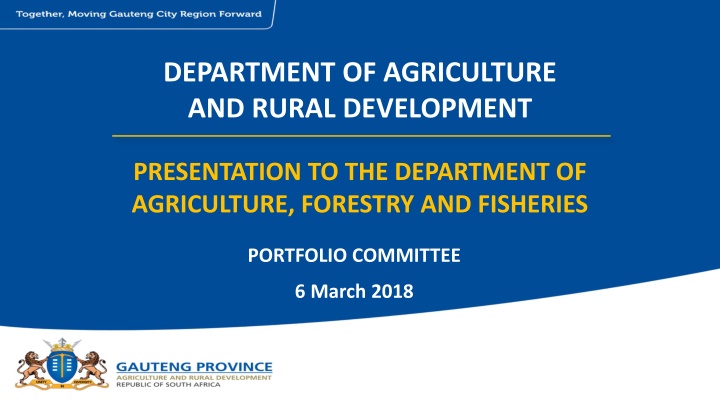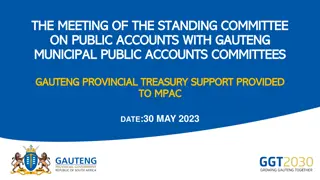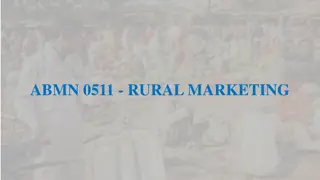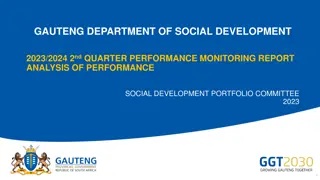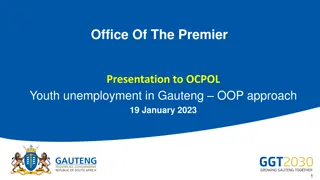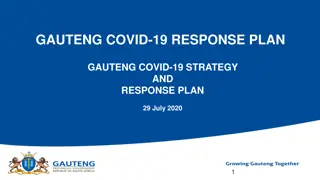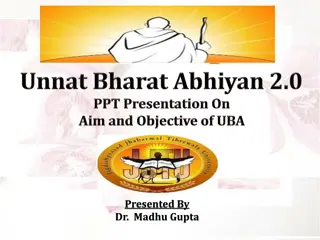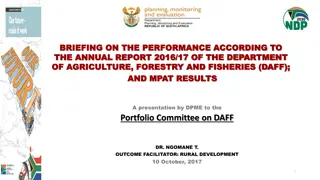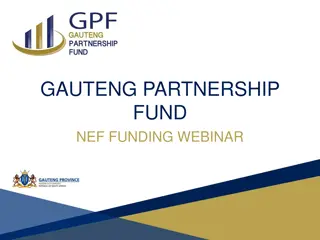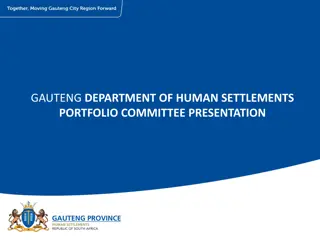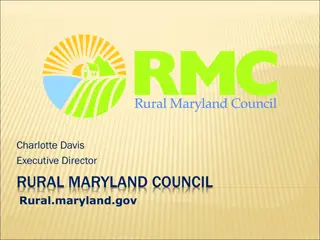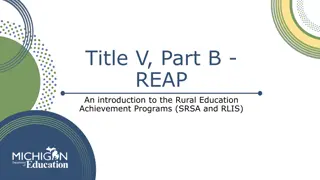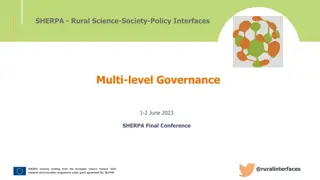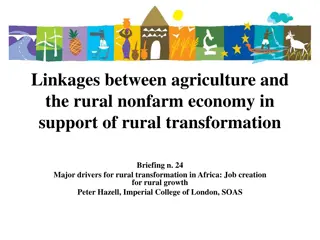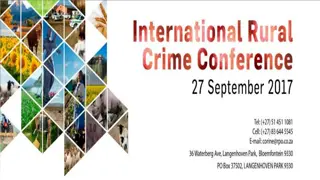Gauteng Department of Agriculture and Rural Development Presentation Summary
This presentation by the Gauteng Department of Agriculture and Rural Development highlights their achievements, vision, and mission. It discusses the implementation of various programs aimed at transforming and modernizing agriculture, promoting food security, and supporting rural development. Key areas covered include progress in Fetsa Tlala targets, planting plans, commercialization of black farmers, recruitment of veterinarians and extension officers, and rehabilitation of agricultural land. The goal is to contribute to economic growth, equality, and sustainable development in Gauteng's rural areas.
Download Presentation

Please find below an Image/Link to download the presentation.
The content on the website is provided AS IS for your information and personal use only. It may not be sold, licensed, or shared on other websites without obtaining consent from the author.If you encounter any issues during the download, it is possible that the publisher has removed the file from their server.
You are allowed to download the files provided on this website for personal or commercial use, subject to the condition that they are used lawfully. All files are the property of their respective owners.
The content on the website is provided AS IS for your information and personal use only. It may not be sold, licensed, or shared on other websites without obtaining consent from the author.
E N D
Presentation Transcript
DEPARTMENT OF AGRICULTURE AND RURAL DEVELOPMENT PRESENTATION TO THE DEPARTMENT OF AGRICULTURE, FORESTRY AND FISHERIES PORTFOLIO COMMITTEE 6 March 2018
TABLE OF CONTENTS Purpose Overview and Introduction The Implementation of Fetsa Tlala 2018/19 Planting Plans and Feedback on the Drought Resistance Seeds Commercialisation on Black Farmers Recruitment of Veterinarians and Extension Officers, Management of Animal Disease The Rehabilitation of Agricultural Land in Provinces. 2
PURPOSE The purpose of this presentation is to provide the DAFF Portfolio Committee with: The Gauteng Department of Agriculture and Rural Development s achievements in the period under review. 3
OVERVIEW VISION An economically transformed agricultural sector and sustainable environmental management for healthy, food secure, developed rural and urban communities in Gauteng. MISSION To radically modernize and transform agriculture, environment and rural development by: Promoting environmental protection and management; Expanding access to agricultural opportunities; Maximising food security; Up-scaling rural development; Promoting the One Health System; Supporting sustainable livelihoods and communities. 4
INTRODUCTION The Gauteng Department of Agriculture and Rural Development (GDARD) through its Programme budgeted structure, Agriculture is aimed to: o consolidate and enhance the role of the agricultural sector in radically transforming, modernizing and re-industrialising Gauteng; and o to support viable and sustainable agricultural enterprises, increase access to food security for all, and ensure comprehensive rural development. The programme s objective is to: o enable and support transformation of the agriculture sector to actively contribute to economic growth, inclusion, equality and the creation of decent work. o boost food security for all and ensure the sustainability thereof, and ensure comprehensive socio-economic development in Gauteng s rural areas. The presentation outlines key budgeted priority programmes and projects the Gauteng Department of Agriculture and Rural Development (GDARD) has implemented in the period under review. The report as far as possible expands on key achievements on; o Progress in the implementation of Fetsa Tlala targets set for 2017/18. o Planting plans for the 2018/19 f Y including feedback on the drought resistance seeds. o Progress on the commercialisation on black farmers as was pronounced in the 2017 SONA, o Progress on recruitment of Veterinarians and Extension Officers, Management of Animal disease and o Progress on the rehabilitation of Agricultural Land in Provinces. 5
THE IMPLEMENTATION OF FETSA TLALA 1.1. Maize production inputs The Department has a comprehensive support program implemented towards achieving the objectives of alleviating hunger in the province through the Fetsa Tlala program. This is even more critical in light of the increasing population in the province. The Department has in this particular regard assisted farmers with Maize production inputs packages. The packages provided includes Seeds, fertilizers, herbicides and pesticides. A total of 73 farmers were assisted with 1 055 maize seeds of 25kg each. In addition, the farmers were assisted with 5 333 bags of fertilizer and 100 litres of pesticides as well as 154 litres of herbicides. REGION NUMBER OF FARMERS QUANTITIES OF MAIZE SEEDS (bags of 25kg) FERTILIZER (50kg) PESTICIDES (litres) HERBICIDES (litres) GERMISTON (SEDIBENG & EKURHULENI) 34 255 1334 34 34L RANDFONTEIN (WEST RAND AND CITY OF JOHANNESBURG) 26 534 2666 44 80 PRETORIA (CITY OF TSHWANE 13 266 1333 22 40L TOTAL 73 1055 5333 100 154 7
THE IMPLEMENTATION OF FETSA TLALA 1.2 Food Security Interventions The department has undertaken further initiatives aimed at assisting communities in the townships and informal settlement with urban agriculture as a mechanism of addressing food insecurity in these areas. In this particular regard the department has supported farmer with establishment of Community gardens, Homestead backyard gardens and school food gardens. 1.3 Mechanization Support The Department has a program aimed at supporting farmers with mechanization to enable them to increase their productive capacity. It has rolled out the support program directly to farmer co-operatives as well as through collaboration with municipalities. The department furthermore has limited stock of tractors that it administers directly to farmers. 1.3.1 Municipal tractors: 38 tractors were utilized to assist farmers through the five provincial Municipalities, the tractors were operational and in good working condition and six (06) tractors had to undergo major service. 1.3.2 Co-operatives tractors: Tractors are struggling administratively and thus, makes it difficult to report usage and supply proof. The usage information and collection of such is based on the department following up on the matter. Out 39 tractors allocated to the 33 Gauteng co-operatives, five (05) tractors are broken in some of the cooperatives and they are struggling to fix them. The rest of the tractors are functional and in good working condition. 1.3.3 Department operated tractors: Out of the 10 tractors that are in GDARD s custody, seven (07) tractors are operational and in good working condition and the other three (03) tractors have gone for repairs. 8
2018/19 PLANTING PLANS AND FEEDBACK ON THE DROUGHT RESISTANCE SEEDS 41 farmers were supported with drought tolerant maize seed variety (TELA Maize with yield gard VTPro). This maize been drought tolerant, it incorporates the BT- technology to make it resistant to stalk borer. A detailed Annexure is attached. In preparation for the next planting season of 2018/19, the Department has committed to assisting 80 maize farmers in the region of Sedibeng and West Rand which are predominantly the maize growing areas of Gauteng. The Department has furthermore to assist this farmers to cultivate 660 hectares. For the food insecure communities in townships and informal settlement, the department has planned to establish 51 Community gardens, 51 school food gardens and 3 620 homestead food gardens. 9
COMMERCIALISATION ON BLACK FARMERS (2017 SONA) On 03 October 2016, DAFF issued a draft commercialisation selection criteria and invited provinces to make inputs. GDARD submitted formal comments and inter alia raised the following comments: i) Registration of farms and legal status, tax; ii) Duration of farm business operations; iii) Management experience and commodity functional knowledge; iv) Farm business operations and turnover; v) Mechanization; vi) Infrastructure; and vii) Labour. In 2016/17 the Department developed a Draft Commercialization Strategy in consultation with key stakeholder in the Province. The Strategy focuses on the following commodities; Livestock, which includes poultry and piggery; Horticulture; Grains; and Aquaculture (recent feasibility study). The Draft Strategy will be published for comment after which it will be submitted to the Executive Committee for adoption. It must be noted that to date the financing model for commercialization has not be finalized. GDARD are participating in a process with DAFF on the investigation and evaluation of a blended financial model. This model encompasses provision of a comprehensive financing package that involves mix of a grant and loan, with the objective of stretching the finance to ensure that it covers all aspects of farm operations required at a commercialization scale per commodity. As a trial of the effectiveness of the selection criteria, GDARD have evaluated its database of all smallholder farmers in the province and developed a preliminary list of 50 commercial farmers but that this list will be subjected to review of the criteria of the final approved Strategy. 10
RECRUITMENT OF VETERINARIANS AND MANAGEMENT OF ANIMAL DISEASE Progress on recruitment of Veterinarians o The rollout of the Compulsory Community Services (CCS) program commenced in 2016. o Gauteng, received the first cohort of 26 veterinary graduates in 2016; 18 in 2017; and 14 in 2018. o Gauteng has gone further to employ 10 veterinarians on contract, who have been in the establishment since 2015. o These serve as mentors for the CCS veterinarians and also help to ensure continuity of community services year-on-year since the CCS Vets are only employed over a period of 12 months. o Since the inception, the Primary Animal Health program has been able to establish a number of mobile animal clinics across the province of Gauteng. These have enabled GDARD to expand its reach and improve access to veterinary services by poorer communities and small scale farmers. Management of animal diseases o The Gauteng province experienced its first outbreak of Highly Pathogenic Avian Influenza (H5N8). o Two (02) layer farms and one (01) broiler breeder farm were affected. o These were depopulated and the process of cleaning and disinfected took place according to the proposed protocol. The sites are currently preparing to restock during the course of this year in order to resume production. 11
RECRUITMENT OF VETERINARIANS AND EXTENSION OFFICERS, MANAGEMENT OF ANIMAL DISEASE Progress on recruitment of Veterinarians o The rollout of the Compulsory Community Services (CCS) program commenced in 2016. o Gauteng, received the first cohort of 26 veterinary graduates in 2016; 18 in 2017; and 14 in 2018. o Gauteng has gone further to employ 10 veterinarians on contract, who have been in the establishment since 2015. o These serve as mentors for the CCS veterinarians and also help to ensure continuity of community services year-on-year since the CCS Vets are only employed over a period of 12 months. o Since the inception, the Primary Animal Health program has been able to establish a number of mobile animal clinics across the province of Gauteng. These have enabled GDARD to expand its reach and improve access to veterinary services by poorer communities and small scale farmers. Management of animal diseases o The Gauteng province experienced its first outbreak of Highly Pathogenic Avian Influenza (H5N8). o Two (02) layer farms and one (01) broiler breeder farm were affected. o These were depopulated and the process of cleaning and disinfected took place according to the proposed protocol. The sites are currently preparing to restock during the course of this year in order to resume production. 112
THE REHABILITATION OF AGRICULTURAL LAND IN PROVINCES The alien and invasive plant species are plant species that are not native to a specific location and has a tendency to spread and cause damage to an environment. Most of these plant species consume a huge amount of water and this has a potential to deplete the scarce water resources as South Africa is a water scarce country. In addition to alien plant species, SA is also experiencing a problem of bush encroachment which is defined as the increase of woody plants (trees and shrubs) densities so that the natural equilibrium of woody plant layer and herbaceous layer densities shift unfavorably resulting into the degradation of the grass layer greatly reducing the grazing capacity of the land. The control of these Alien and encroaching species can be done using Mechanical (cutting, pulling); Chemical (use of registered herbicides) or Biological (use of natural enemies) or a combination of these methods. BENEFICIARIES CONTACT FARM NAME MUNICIPALITY HECTARES CLEARED Mr. Charles Yende 082 659 0097 074 730 1856 061 394 0704 082 839 4436 073 468 2260 079 590 6362 Nooitgedacht portion 5 Kraalkop 147 IQ Portion 25 Sluis 46 IQ Vaalfontein Rietfontein 336 IQ Faranani Ennerdale CA community project Lesedi Local Municipality Merafong City Local Municipality Mogale City Local Municipality Emfuleni Local Municipality City of Johannesburg Metropolitan Municipality City of Johannesburg Metropolitan Municipality 163 228 439 104.5 541 15 Ms. Prudence Ramfate Mr. Happy Tlhame Mohane Ms. Pinky Tlhabedi Ms. Olga Nomonde Mr. Happy Seane TOTAL 1 490.5 To date 1 475.5 ha of land has been protected/ rehabilitated through the removal of alien invasive and bush encroaching plant species in various Gauteng Districts and Metros as depicted in the table above. The 1st five projects in the table below depicts most common alien species removed include the Bluegum trees, Wattle and Lantana Camera whilst the Bush encroaching species is the Slangbos. Conventional farming methods also have a potential of damaging land resources. To mitigate against this, Conservation Agricultural (CA) methods are used. CA focuses on 3 principles: No till (minimum soil disturbance); Permanent Soil Cover and Crop Rotation. A 15ha plot in Ennerdale was converted from conventional to CA farming practices. 13
